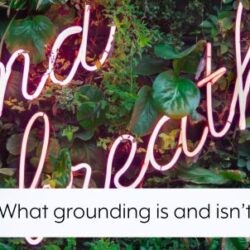
‘Trust me,’ says the therapist.
And everything in me wants to curl up and away, disappear some place in my head, and never come back.
It is an understatement to say it, but those two words are a massive trigger.
Because ‘Trust me’ said several of my abusers. ‘Trust me’ is the implicit message, even if never spoken, by parents whose responsibility it was to protect me and yet who both facilitated and inflicted the abuse. ’Trust me’ is easy to say and almost impossible for an abuse survivor to obey.
Every single therapist I have worked with has said these words at some point. Of course they have – it’s a normal, natural thing to say. It slips out easily. It’s meant with the best of intentions – to be soothing, to be reassuring, to calm some fears that have slipped in from the past, and to say, ‘Hey, it’s okay. You’re in safe hands here. I’m not your abuser. I’m not your mother. I’m not going to hurt you. I’m here to help.’
They are good words to say, and helpful words to say. When they are shortened into ‘Trust me’, though, their meaning – their tone, their intention, their sincerity and lack of guile – can sometimes be lost in translation, simply because those two words together spark memories of moments right before the abuse and which our brains have logged as ‘Beware! You’re about to be hurt!’
It’s not even that I’ve ever wanted therapists to stop saying it. I have never wanted the therapists I’ve worked with to be afraid of unintentionally triggering me. The trigger itself is grist for the mill. It shows us what we have yet to process, what is still dissociated, what still holds way too much power in our lives. Without ever being triggered, we don’t see the clues to what remains hidden. So do we see triggers as unwelcome intruders into the therapy room? Or do we see them as messengers guiding us to material that we weren’t aware was there? Do we trust our brains to guide us towards healing?
The issue of trust underpins everything that happens in the therapy room. The very nature of the therapeutic relationship is predicated on trust: I will come, with all my hot, volatile, undignified mess and I will sit and expose it to another human being. Really?! It sounds like insanity! To sit in the room with another human being and reveal our soft underbelly is an act of tremendous trust. On the one hand, we rightly say that we struggle with trust, and yet on the other, every single week we sit in a chair and trust that we will not be rejected, mocked, humiliated or betrayed.
This is why the responsibility of the therapist is so great. This is why boundaries are so important. This is why professionalism is a must.
Trust isn’t built by the big things. Certainly, though, it can be destroyed by the little things.
Trust is built on the therapist showing up, calm and grounded and centered, in the green zone, with their defences low and their attunement high.
Trust is built in holding hope for the client when hope has abandoned the client.
Trust is built in the details of the contracting, of sticking to what you’ve agreed, on clarifying what’s become muddied.
Trust is built in saying you got it wrong.
Trust is built on being clear about who carries responsibility for what on either side of the therapeutic dyad.
Trust is built by doing everything in the client’s best interests.
Trust is built in the therapist becoming neither rescuer nor persecutor, nor falling victim to the client’s dissociation or rage.
Trust is built by holding firmly to boundaries.
Trust is built on allying with the client to reach their goals, not sowing secret agendas into the therapy, to influence them to become like you.
Trust is built by good supervision silently keeping the space safe.
Trust is built through touch, and trust is built through not touching, and knowing the appropriateness of both.
Trust is built on seeing and hearing and feeling everything that the client brings, with true unconditional positive regard, not just the appearance of it.
Trust is built by the highest standards of confidentiality.
Trust is built by the rituals of hello and goodbye, of continuity and predictability, of private jokes and friendly jousting.
Trust is built by the therapy being about the client, not about the therapist.
Trust is built by continually learning more.
Trust is built on believing that the client is the expert on themselves and not imposing upon them a label, diagnosis, framework, or theoretical approach, but collaborating with them to find the right way forwards for them.
Trust is built by the room looking and sounding and smelling the same each week.
Trust is built on validating the client’s experience of the world, of the therapy, of the therapist, of themselves, even when it’s clouded by the filter of trauma, because it’s still their experience.
Trust is built on the emotions that land in the therapist’s eyes and face as a mirroring back to the client of their pain, their grief, their sadness, their rage.
Trust is built by the therapist knowing what they don’t know.
Trust is built in the kindness and the gentleness and the softness, and trust is built in the challenge and the steadiness and the exhortation to courage.
Trust is built by the therapist’s knowledge and power being used in service of the client, not as leverage over the client.
Trust is built by building trust a little at a time, time after time, and that trust not being broken.
Trust is built by the therapist having appropriate confidence in their own competence and character.
Trust is built in believing in the client when the client can’t see what there is to believe in.
Trust is built by always telling the truth.
Trust is built by feeling seen, and feeling heard, and feeling felt.
By even entering therapy, I’m demonstrating trust in the therapist. That trust can grow – at times, too, it can shrink – but it’s never static. Trust is a dynamic quality that is proven and reproven and built and broken a hundred times in every session. By mistrusting, our brains are trying to protect us from being hurt like we were hurt as children: it’s a smart move. We need to be wary. We need to be wise. ‘How can I trust you?’ I want to cry, even though by doing so, I’m demonstrating trust that it’s okay for me ask such a question.
What is trust built on for you? As a client, how does a therapist win your trust? As a therapist, how do you know when and how to trust your professional instinct, your gut feelings, your red flags, your emotions? How is trust built when trauma has so eroded it?



12 Comments
Absolutely spot on!!! I became a counselor 2 years ago and I am genuinely learning to be humble, respectful and led by whomever sits before me. Thank you for this blog post!
I appreciate this so much. People sometimes come to me apologizing that they still don’t quite trust me.
“That’s completely understandable,” I say. “It’s on me. I know that I need to earn your trust.”
I love the list you’ve made here of some of the ways the trust in a relationship such as this one can be strengthened. Thank you.
Thank you for your words….as always in your writing for me…you share you , you have such wisdom gained through trusting …and you offer it for us to see,to read and to learn…trusting again. Thank you as a counsellor I feel in my experience you can’t just take trust for granted ..every meeting it’s to be gained and worked towards .You validated the importance of what we offer and how we offer …just being ourselves and offering a real relationship…..thank you .
Bloody brilliant
I think I trust, then the boundaries are moved, and I have to start the whole process again.
I would really appreciate reading more about this as I resonate to your comment, J.
This was so interesting to read , when trust is broken, it feels much worse than before trust was gained
This is so true. My work with clients is all about them slowly dipping their toe in the water. But being able to come back out . Understanding that safety is not a consistent feeling for clients they will start to trust then retract. Safety and trust is a huge gamble for clients one which as a therapist I never take for granted. Allowing the client to use their self protection is key for safety slowly being built .
Thank you so much for sharing.
You help me feel less alone.
* boundaries the therapeutic boundaries, I didn’t ” get” them for such or most of my life. I understood other people’s but never heard my own. Having boundaries upheld in therapy and then too explicitly pointing out when I said something that was one of my boundaries changed so much in my life.
* safety followed the boundaries as they were completely different from anything before and were there to protect everyone. No ulterior motive.
* safety lists and coping mechanisms. Therapist applying the breaks and not letting things go overwhelming.
* trust is so sacred and only the kindest , respectful people deserve it.
I find I’m constantly challenging my therapist with that cry of “can I trust you?”, and multiple times per session I feel unsafe. The only way through for me is to voice that, and trust is built every time she doesn’t shame me for my hyper vigilance. She recently moved her furniture around in the therapy room, and though I liked it, the change has thrown me. There is more space around her, she seems less contained and less safe. Being able to acknowledge that and be understood also builds trust. Lots of small moments of validation add up.
Ah…
This nailed why I never do well in therapy, whether in one on one sessions or in the facilities I was placed in as a child. The therapists and staff demanded I trust them even after repeatedly denying me a reason to. Then I’m uncooperative for distrusting them.
I’d like to find someone I can trust. But knowing someone can be trusted means putting myself in danger. So I don’t know.
A wonderful list! And as comprehensive as it needs to be. Interestingly, as a therapist I have never said trust me! Trust is a concept to be explored I think, but to demand trust is a bit like saying ‘this is a safe space’. It’s not for the therapist to dictate, it’s for the client to learn about and they can explore the landscape together.